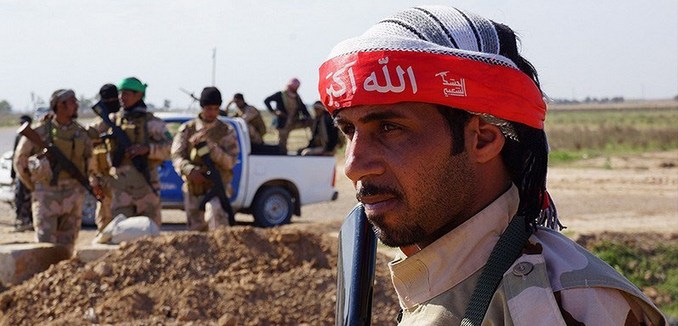Iran-backed militias in Iraq are raising flags identifying their Shi’ite loyalties in the battle to oust the Islamic State from Mosul, raising concerns among local leaders in the Sunni-majority region, Reuters reported Sunday.
The militias, also known as Popular Mobilization Forces (PMF), mostly includes “groups trained by Iran and loyal to its Supreme Leader, Ayatollah Ali Khamenei,” which have close ties to General Qassem Soleimani, head of the Islamic Revolutionary Guards Corps’ elite Quds Brigade, Reuters noted. Soleimani was seen touring the front lines in Mosul last week, despite being subject to a United Nations travel ban over his support of terrorism and proliferation activities.
The flags displayed by the PMF included those of various militias with a history of human rights abuses. “Among the banners that could be seen flying from artillery cannons, communication towers and buildings recently retaken from Islamic State were those of Kataib Hezbollah and Asaib Ahl al-Haq, two of the main Iranian-backed groups, alongside the Badr Organization, considered the largest,” Reuters reported.
According to Amnesty International, the PMF have been known to commit “serious human rights violations, including war crimes” against Sunnis escaping from ISIS-controlled areas.
While the militias have not been linked to sectarian incidents during the Mosul offensive thus far, their presence has been a cause for concern for local officials in the Sunni-dominated region. “Though Sunday was only the second day that the PMF had officially joined the battle against Islamic State, the banners and slogans of the organization made it clear that theirs is a pan-Shi’ite cause that may not end at Iraq’s borders,” Reuters noted.
In August, Reuters reported that the United States had failed to restrain the PMF from committing widespread human rights abuses against Sunni civilians during the battle for Fallujah. In March 2015, similar reports about the atrocities committed by the Shi’ite militias emerged following the battle for Amerli.
The close ties between Iran and the PMF, which the Associated Press called “just as brutal” as ISIS in 2014, have been extensively documented. The militias are headed by Abu Mahdi al-Mohandis, who U.S. officials have accused of bombing the American and French embassies in Kuwait in 1983. Al-Mohandis, a deputy of IRGC chief Soleimani, was designated by the U.S. Treasury Department in 2009, along with Kata’ib Hezbollah, one of the main PMF militias, for targeting American and coalition forces in Iraq.
The UN’s high commissioner for human rights, Zeid Ra’ad al-Hussein, declared in July that there was strong evidence that the PMF committed atrocities in the battle for Fallujah.
In On this Battlefield, the U.S. and Iran work Hand in Hand, which was published in the April 2015 issue of The Tower Magazine, Michael Pregent observed that Iran-backed Shi’ite militias were targeting Sunnis in Iraq, undermining American efforts to encourage them to fight against ISIS.
At the moment, the U.S. is urging the Iraqi government to make tangible concessions to both Iraqi Sunnis and Kurds, but the U.S. is finding its recommendations subordinated to those of the Iranian regime. Tehran wields more influence over the Shia-led government of Iraq than the United States does, and this close alignment between Baghdad and Tehran is a political dynamic that ISIS and other militant groups continue to exploit for popular support. At the same time, Iran’s political influence in Baghdad is resulting in further disenfranchisement of the country’s Sunni and Kurdish populations.
Moreover, the Sunni population is perplexed by our constrained role in arming them, while we partner with Shia militias that killed Americans and Iraqis during the Iraq War, and that make no distinction between all Sunnis of military age and ISIS.
[Photo: Ahmad Shamloo Fard / WikiCommons ]




